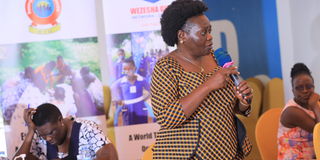MPs call for review of the National Sexuality Education framework

Tororo Woman MP, Ms Sarah Opendi speaking during a consultative meeting on enhancing collective action to promote sexual reproductive health and rights for girls. PHOTO | ROLAND D. NASASIRA
Members of Parliament from the Uganda Women Parliamentary Association (UWOPA) have asked the government to review and update the National Sexuality Education framework, to include girls outside school.
Released in 2018 by the Ministry of Education and Sports, the framework sought to create an overarching national direction for providing young people with sexuality education in the formal education setting.
The MPs’ plea comes at a time when the National Planning Authority report 2021 noted that prolonged school Covid-19 induced lockdown led to 51 per cent of learners across the entire education system to drop out of school, with majority, accounting for 60 per cent from the primary subsector.
Ms Sarah Opendi the UWOPA Chairperson noted that teenage pregnancy is not in one part of the country but countrywide.
“I thought this (National sexuality education framework) was one of the things that would help Uganda reduce the high numbers of teenage pregnancies and abortion in this country. When you talk to young girls, they say they go to health centres with no youth friendly corners. We know some children are actively engaged in sex and you cannot stop them, but let them not get pregnant,” the Tororo Woman MP, said.
“For us to deal with this challenge, we need to have school health policies where children are taught about dangers of engaging in early sex, but not using the comprehensive sexuality education framework because it has since been hijacked by those who want to promote homosexuality in this country,” she added.
Ms Opendi made these remarks on Tuesday during a consultative meeting in Kampala on enhancing collective action to promote sexual reproductive health and rights for girls in and out of school, organised by Raising Teenagers Uganda.
“In trying to see the policy approved, some people decided to use it as a get way to incorporate unacceptable behaviour in this country. Some teachers were being infiltrated by some wrong elements and started sodomising children and we have evidence from different schools,” Opendi added.
On her part, Ms Rose Obiga, the Woman Member of Parliament for Terego, observed that it is time for all communities to re-employ traditional methods where children are raised by the community.
“When you find your neighbour’s child in a mess, punish them because there are so many absentee parents who are so protective. In my constituency, I remind parents and communities about their responsibilities. Seeing girls married off against their will and before the age of 18 is not only an embarrassment to the family but the entire village,” Ms Obiga said.
The National Planning Authority 2021 report added that approximately 30 percent of learners were projected not to return to school forever due to teenage pregnancies, early marriages, and child labour, elements that children not in school are subjected to.
To avert the effects of teenage pregnancy and help girls out of school live a meaningful life, Ms Flavia Kalule, the Woman MP for Kassanda District advised the government that girls out of school need economic skilling such as bakery and tailoring, because they have no future plans, on top of being in risky relationships.
Ms Hope Nankunda, the Executive Director of Raising Teenagers Uganda, said sexuality education for girls out of school is important because lack of information pushes them to make uninformed decisions, the reason many end up becoming victims of teenage pregnancy and child marriage.
“When there are safe spaces for young people out of school, they will understand how to behave, the risks involved when they get into sexual relationships but also understand menstruation issues. Menstruation is a sexual reproductive health issue and many girls do not have this information because many parents do not talk to girls about menstruation and puberty. This information will help reduce and end cases of teenage pregnancy, gender based violence and child marriage,” Ms Nankunda explained.
Ms Nankunda also urged Members of Parliament to appreciate that sexual reproductive health rights in the framework are in place for those in the formal setting, yet similar rights are needed for those in the informal setting because there are many young girls who dropped out of school due to Covid-19 yet they should not miss out on such information.




